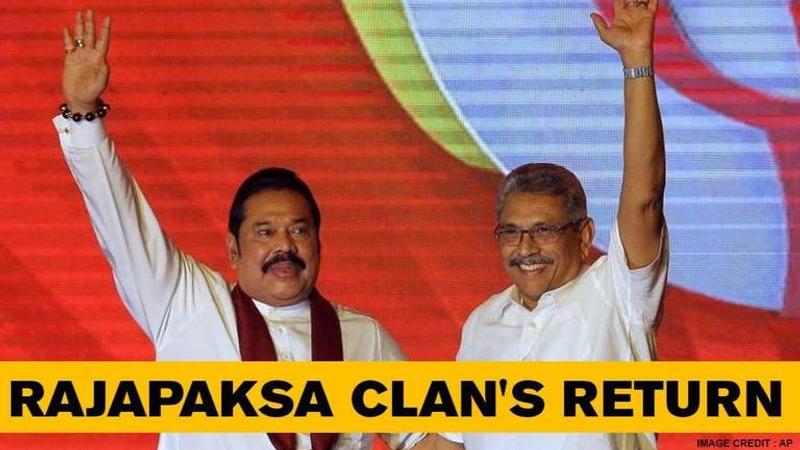Published 18:32 IST, August 9th 2020
Rajapaksa clan's return: With Mahinda as PM, Rajapaksas hold all 3 top posts in Sri Lanka
With Mahinda Rajapaksa sworn in as Sri Lanka's Prime Minister for the fourth time on Sunday, the powerful Rajapaksa clan now holds all the major posts in govt

With Mahinda Rajapaksa sworn in as Sri Lanka's Prime Minister for the fourth time on Sunday, the powerful Rajapaksa clan now holds all the major posts in the government. 74-year-old Mahinda Rajapaksa was previously appointed as PM by Sri Lankan President and younger brother - Gotabaya Rajapaksa on 21 November 2019, two days after Gotabaya won the Presidential elections in the wake of the Easter bombings. Apart from Mahinda - who was also former President, his son Namal, his eldest brother Chamal (77), and his son Sashindra, and nephew Nipuna Ranawaka have been elected as MPs to the parliament. With the re-election of Chamal - a former Speaker, it is assured that a Rajapaksa will hold all top three posts of the Sri Lankan government.
2020 Prime Ministerial elections
The Rajapaksa's Sri Lanka Podujana Peramuna party - leading the Sri Lanka People's Front, won 145 seats in the 225-member parliament in the election last Wednesday. Its main opponent, the SJB obtained 54 seats, while a minority Tamil party won 10 seats and 12 smaller parties won 16 seats amongst them. With almost two-thirds of the majority, the Rajapaksas have returned completely to power in the island nation, strengthening its dynastic ruling style.
The Rajapaksas rise
Mahinda Rajapaksa's presidency from 2005-2015 was hugely popular among Sri Lanka's Sinhalese population for ending Sri Lanka’s 37- year-long civil war against the Tamil Tigers in 2009. After leaving office in 2015, he contested for the Prime Ministerial elections but lost to Ranil Wickremasinghe. In 2018, he was appointed as Prime Minister by President Maithripala Sirisena after Wickremesinghe lost the support of the United People's Freedom Alliance. While two no-confidence motions were passed, President Sirisena rejected them. After the Supreme Court deemed it unconstitutional, suspending Rajapaksa's powers as Prime Minister and forcing him to prove his government's legitimacy, he resigned as PM.
Meanwhile, his brother - Gotabaya - the former defense chief of the nation, won the Presidential elections in November 2019 after running up his campaign mainly on security, in the wake of the Easter bombings. Gotabaya, feared by the 15% Tamil minority, led the Sri Lankan Armed forces successful war against Liberation Tigers of Tamil Eelam (LTTE) - Velupillai Prabhakaran in 2009. With then-President Sirisena facing fire for the lack of security during the Easter attacks, plunging the country into multiple emergencies from April 22 to August 24, Gotabaya easily defeated his main contender - Premadasa from the governing liberal United National Party (UNP) and son of assassinated former president Ranasinghe Premadasa, garnering 52.87 percent of the votes. Amid the COVID pandemic, he dissolved the Parliament in March and called for early snap elections, naming his brother Mahinda as Prime Ministerial candidate.
What do the Rajapaksas aim to change?
The Rajapaksas aim is to bring constitutional change by repealing the19th amendment - which establishes a Constitutional Council which will exercise some executive powers held by the President. The amendment passed under then-President Sirisena in 2015 set up independent commissions like - The Election Commission, The Public Service Commission, The National Police Commission, The Finance Commission, The Human Rights Commission of Sri Lanka, The University Grants Commission, The police commission etc. With the Rajapaksas gaining 145 of the required 150 seats to change the constitution, activists fear weakening government institutions, restrictions on Freedom of Speech and alleged human rights abuses on Tamil minorities.
Rajapaksas with India & China
India's relations with Sri Lanka became strained in 2014 when a Chinese submarine and warship were allowed to dock in Colombo and the 99-year lease of the Hambantota port in southern Sri Lanka to China in 2015. With Gotabaya's re-election, he pledged to rebuild Sri Lanka's intelligence services and work closely with India. Moreover, Prime Minister Modi was among the first to congratulate both Gotabaya and Mahinda on their successful re-election.
However, China too welcomed the re-election of the Rajapaksas. According to economists, Sri Lanka which is facing severe economic constraints has China as its biggest source of foreign direct investment, followed by India. Moreover, Rajapaksas were favoured by the Chinese as experts point out Beijing's support to Sirisena's move to replace Ranil Wickremesinghe with Mahinda Rajapaksa as Prime minister, which was later struck done by the Supreme Court. With the rise of yet another 'strongman-style' government in Asia, experts feel Sri Lanka will play as a 'battleground for India and China'.
Updated 18:39 IST, August 9th 2020




